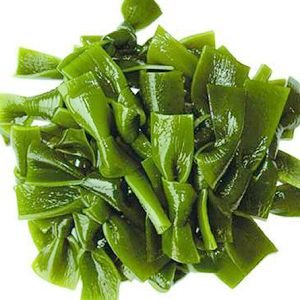
 Kelp is a large seaweed that usually grows on colder waters like the Baltic and North seas, as well as the Pacific and Atlantic oceans.
Kelp is a large seaweed that usually grows on colder waters like the Baltic and North seas, as well as the Pacific and Atlantic oceans.
It is also known as brown algae, bladderwrack and Fucus vesiculosus, which is its scientific name. It’s the healthiest of all sea vegetables due to various vitamins and trace minerals.
Kelp is often used as a food ingredient and herbal medicine not only for humans but for all animals as well including cats.
It is known to be an excellent source of iodine, which is beneficial for thyroid problems like hypothyroidism in which the thyroid gland does not function properly. This results to various problems like slow metabolism and growth.
It also contains sodium alginate, which can protect the body from radiation. Vitamin B, which is one of the vitamins that can be found on kelp, improves metabolism and provides energy.
Other vitamins and minerals that are present on kelp are Vitamins C and E, magnesium, boron and calcium.
Can I Give My Cat Kelp? Answer: Yes
Kelp is full of nutrients that it is not only beneficial to people but to cats and other pets as well.
It is a commonly used ingredient on cat supplements, which is vital in ensuring that your pet receives the right amount of vitamins and minerals that it needs to keep healthy. These supplements can be in the form of tablets or powder. Since the amount of kelp contained by these products vary, it is important to check on the label for the instructions and proper dosage.
The dosage depends on the weight of your pet.
The age of the cat when it can be used, its interaction with other medications, the precautions of using it, as well as knowng if it safe during pregnancy or lactation are all included on the label. It is important to keep the right dosage to prevent any problems.
One of the possible side effects of too much kelp consumption is hyperthyroidism.
This is why it is not recommended for cats that are already suffering from this condition. Though it is generally safe to give to your pet the dosage given on the label, you may still want to consult your vet if you want to make sure that you are giving the right amount.
Aside from providing the nutrients that your cat needs, as well as keeping it healthy and energetic, there are other benefits that your pet can get from using kelp. This includes boosting the immune system to prevent your pet from getting sick and aiding proper digestion.
It is also beneficial to its skin, hair and bones.
Other Uses of Kelp
Kelp supplements are also available for humans.
You too can benefit from the vitamins and minerals that can be found on it. Since it helps improve metabolism, this is a great supplement for losing weight.
Accompanied by balanced diet and regular exercise, it would be easier to get the figure that you’ve always wanted. Kelp tablets and liquids can also be taken to improve immune system and fight various kinds of diseases.
If you are suffering from indigestion or constipation, you may add kelp on your soup, as well as sauces or boost your energy by making a smoothie with kelp powder.
Aside from its benefit on the health, it is also used on foods. Alginates that come from sea kelps are extracted and used as ingredients on various products such as beer, ice cream, bread, pies, cakes, preservatives, syrups and sauces.
Furthermore, seaweed is commonly used in cooking on Asian countries, especially on soups and dumplings. Kelp is also used in creating various items like paints, plastics, textiles and cardboards.
Common Side Effects (In Humans)
While too much kelp on cats can contribute to thyroid problems, over consumption on humans can also have negative effects.
The side effects of kelp vary from one person to another. Similarly for cats, since kelp is rich in iodine, it may cause high levels of thyroid hormones in the body, which can lead to hyperthyroidism. Some of the symptoms of hyperthyroidism are hair loss, palpitations, increased heart rate, breathlessness, insomnia and fatigue.
Some products made from kelp may be contaminated with metals, which can cause kidney problems. This is why it is important that you use only trusted brands.
Other Foods to Consider
There are foods that are good for your cat and there are those that could be harmful if ingested.
It is important to know them so you can be sure that you are giving the right foods to your feline friend. Some of the foods that are good for cats are vegetables, cheese, cooked eggs and meat.
Foods that you should never give to your pet include raw fish, nuts, raisins, chocolate, tea and alcohol.
Use kelp supplement to ensure that your cat gets the nutrients that it needs. Be sure to check on the label and follow the instructions properly for the right dosage. But before giving this or any type of supplement to your pet, it is recommended to consult your vet.

My deceased husband’s part feral cat has vomited. The local vet has retired
and the new one charges exorbitant prices. What can I do?